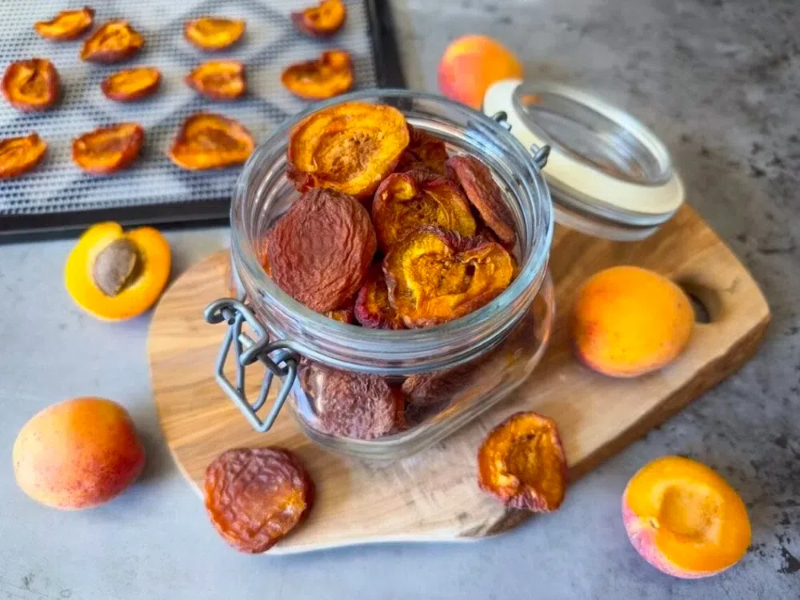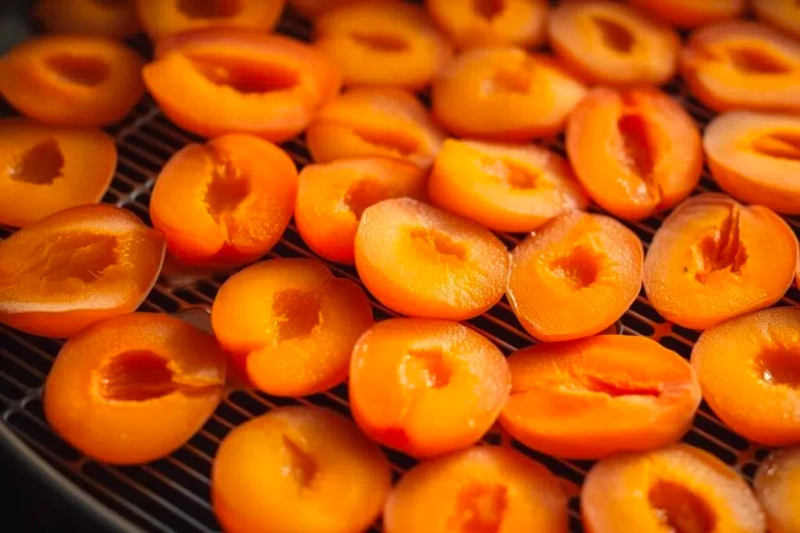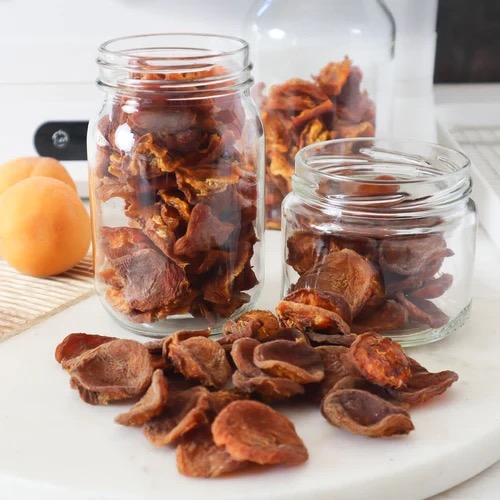
Content Menu
● Why Use a Food Dehydrator?
● Preparing Apricots for Drying
● Arranging Apricots in the Dehydrator
● Setting Up the Dehydrator
● Tips for Successful Drying
● Storing Dried Apricots
● Using Dried Apricots in Recipes
● Health Benefits of Dried Apricots
● Conclusion
● FAQ
>> 1. How long does it take to dehydrate apricots?
>> 2. Can I use other fruits in my dehydrator?
>> 3. Why do my dried apricots not look bright orange like store-bought ones?
>> 4. What should I do if my dehydrated apricots feel sticky?
>> 5. Can I dehydrate other types of fruit?
● Citations:
Drying apricots at home using a food dehydrator is an excellent way to preserve their flavor and nutrients. This process not only extends the shelf life of apricots but also creates a delicious snack that can be enjoyed throughout the year. In this article, we will explore the step-by-step process of dehydrating apricots, including preparation, drying techniques, and storage tips.

Why Use a Food Dehydrator?
Using a food dehydrator offers several advantages over traditional drying methods:
- Controlled Environment: Dehydrators maintain consistent temperatures, ensuring even drying without the risk of burning the fruit.
- Efficiency: They can dry large batches of fruit simultaneously, saving time and energy.
- Nutrient Retention: Dehydrators preserve more nutrients compared to sun-drying or oven-drying methods.
Preparing Apricots for Drying
To achieve the best results when dehydrating apricots, proper preparation is essential. Here's how to prepare your apricots:
1. Select Fresh Apricots: Choose ripe, firm apricots without any blemishes or bruises. Look for fruits that yield slightly to pressure but are not overly soft.
2. Wash the Apricots: Rinse the apricots under cold water to remove any dirt or pesticides. This step is crucial as it ensures that your dried fruit is clean and safe to eat.
3. Cut and Pit:
- Cut each apricot in half and gently twist to separate the halves.
- Remove the pit from each half using your fingers or a small knife.
4. Optional Pre-Treatment: To enhance color and flavor while preventing browning, soak the apricot halves in a solution of 1 cup lemon juice mixed with 4 cups of water for about 10 minutes. This step is optional but recommended for better preservation.
5. Pat Dry: After soaking, drain the apricots and pat them dry with paper towels. Removing excess moisture will help speed up the drying process.
Arranging Apricots in the Dehydrator
Once your apricots are prepped, it's time to arrange them in the dehydrator:
- Place the apricot halves cut side up on the dehydrator trays.
- Ensure there is enough space between each piece to allow for proper air circulation. Overcrowding can lead to uneven drying.
Setting Up the Dehydrator
Now that your apricots are arranged, it's time to set up your dehydrator:
1. Temperature Setting: Set your food dehydrator to 135°F (57°C). This temperature is ideal for drying fruits without cooking them.
2. Drying Time:
- Check on your apricots after 12 hours.
- Depending on their size and juiciness, they may take anywhere from 12 to 24 hours to fully dehydrate.
3. Check for Doneness: The apricots are done when they are pliable and leathery but not sticky or wet. If they feel too moist, continue drying and check every couple of hours.

Tips for Successful Drying
To ensure you achieve optimal results when dehydrating apricots, consider these additional tips:
- Use Quality Equipment: Invest in a reliable food dehydrator with adjustable temperature settings and adequate airflow. This will help ensure even drying.
- Rotate Trays: If your dehydrator has multiple trays, rotate them halfway through the drying process to promote uniform drying.
- Avoid Over-Drying: While it's important that your apricots are fully dried, be cautious not to over-dry them as this can lead to a tough texture.
Storing Dried Apricots
Once dried, it's crucial to store your apricots properly to maintain their quality:
- Cooling: Allow the dried apricots to cool completely before storing them. This helps prevent condensation inside storage containers.
- Airtight Containers: Store them in airtight containers or vacuum-sealed bags to prevent moisture absorption. Glass jars with tight-fitting lids or Mylar bags work well for this purpose.
- Storage Location: Keep them in a cool, dark place away from direct sunlight. Properly stored dried apricots can last up to a year.
Using Dried Apricots in Recipes
Dried apricots are versatile ingredients that can enhance various dishes. Here are some ideas on how you can incorporate them into your meals:
- Snacks: Enjoy dried apricots as a healthy snack on their own or mixed with nuts and seeds for a nutritious trail mix.
- Baking: Add chopped dried apricots to muffins, bread, or cookies for added sweetness and texture.
- Salads: Toss dried apricots into salads for a burst of flavor and chewiness. They pair well with greens, nuts, and cheese.
- Savory Dishes: Incorporate diced dried apricots into grain dishes like quinoa or rice pilafs for an interesting flavor contrast.
- Smoothies: Blend dried apricots into smoothies for natural sweetness and added fiber.
Health Benefits of Dried Apricots
Dried apricots are not only delicious but also packed with health benefits:
- Rich in Nutrients: They are an excellent source of vitamins A and C, potassium, iron, and dietary fiber.
- Antioxidant Properties: Dried apricots contain antioxidants that help combat oxidative stress in the body.
- Digestive Health: The fiber content in dried apricots promotes healthy digestion and regular bowel movements.
- Heart Health: The potassium found in dried apricots supports heart health by helping regulate blood pressure levels.
Conclusion
Dehydrating apricots using a food dehydrator is a straightforward process that yields delicious results. With just a few steps—preparing, arranging, and drying—you can enjoy homemade dried apricots anytime. This healthy snack not only preserves the essence of fresh fruit but also provides convenience for various recipes and snacking occasions.
By following these guidelines, you can ensure that your dried apricots are flavorful and nutritious while also extending their shelf life significantly. Whether enjoyed on their own or incorporated into various dishes, dehydrated apricots make for an excellent addition to any pantry.

FAQ
1. How long does it take to dehydrate apricots?
The drying time for apricots typically ranges from 12 to 24 hours at 135°F (57°C), depending on their size and juiciness.
2. Can I use other fruits in my dehydrator?
Yes! Many fruits such as apples, peaches, and pears can be dehydrated using similar methods as apricots.
3. Why do my dried apricots not look bright orange like store-bought ones?
Store-bought dried apricots are often treated with sulfur dioxide to enhance their color. Homemade versions may appear darker but are free from preservatives.
4. What should I do if my dehydrated apricots feel sticky?
If your dried apricots feel sticky, they may not be fully dried. Return them to the dehydrator for additional time until they reach the desired texture.
5. Can I dehydrate other types of fruit?
Absolutely! Many fruits can be successfully dehydrated using this method, including apples, bananas, and berries.
Citations:
[1] https://www.thefoodieaffair.com/dehydrated-apricots/
[2] https://puttingupwiththeturnbulls.com/2011/08/06/dehydrating-apricots/
[3] https://www.backpackingchef.com/dehydrating-apricots.html
[4] https://www.masalaherb.com/dehydrated-apricot/
[5] https://homesteadandchill.com/how-to-dry-apricots-dehydrator-oven/
[6] https://www.luvele.com.au/blogs/recipe-blog/how-to-dry-apricots-in-a-food-dehydrator
[7] https://www.youtube.com/watch?v=CBLppS4Pqyk
[8] https://manzanillanyc.com/how-to-dehydrate-apricots-in-dehydrator/
[9] https://farmhouselilies.com/how-to-dehydrate-apricots/
[10] https://www.excaliburdehydrator-recipes.com/recipe/dried-apricots/
[11] https://www.youtube.com/watch?v=b-5VP79md_Y
[12] https://www.alamy.com/stock-photo/natural-apricot-drying.html
[13] https://www.istockphoto.com/photos/dried-apricot-drying-dry-fruit
[14] https://www.youtube.com/watch?v=GF4fdWM8liM
[15] https://stock.adobe.com/search?k=%22dried+apricot%22
[16] https://www.pinterest.com/ideas/dehydrated-apricots/923809503878/
[17] https://www.youtube.com/watch?v=Cmbuz7FAryE
[18] https://www.alamy.com/stock-photo-dehydrator-tray-of-homemade-dried-apricots-ready-to-be-eaten-85376281.html
[19] https://www.youtube.com/watch?v=giqtfnW7vpY
[20] https://www.pinterest.com/pin/143059725658927315/
[21] https://www.youtube.com/watch?v=20mIMvqFGtc
[22] https://www.alamy.com/stock-photo/apricot-drying.html
[23] https://www.youtube.com/watch?v=ru5TXoOSVH8
[24] https://www.freepik.com/free-photos-vectors/natural-apricot-drying
[25] https://www.luvele.com/blogs/recipe-blog/how-to-dry-apricots-in-a-food-dehydrator
[26] https://create.vista.com/photos/drying-apricots/
[27] https://www.istockphoto.com/de/bot-wall?returnUrl=%2Fde%2Fphotos%2Fdried-apricot











